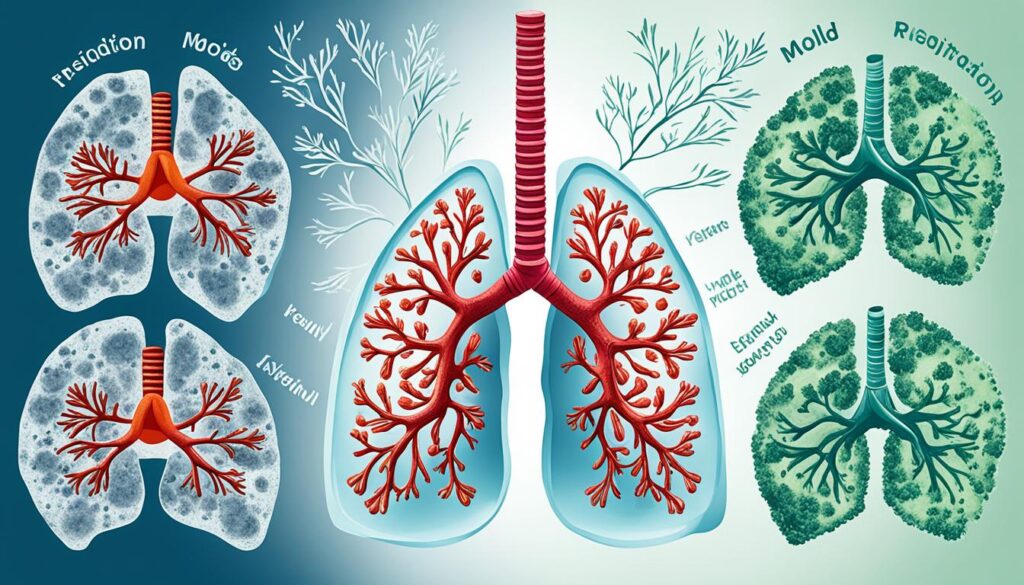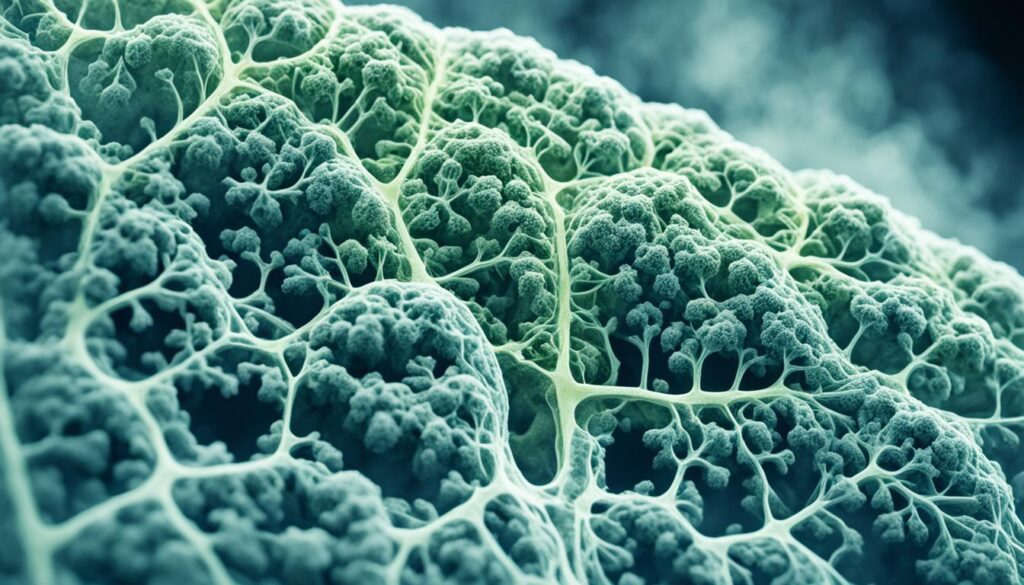
Symptoms of Mold in Lungs Miami: Know the Signs
Welcome to our informative article on the symptoms of mold in the lungs that individuals in Miami may experience. Mold can have a significant impact on respiratory health, especially when it enters the lungs. It is essential to recognize the signs of mold-related respiratory issues to protect your lung health effectively.
Living in Miami, where mold is prevalent, makes it even more crucial to be aware of the symptoms that may indicate mold-related lung problems. By understanding these signs, you can take prompt action and seek professional assistance to ensure your overall well-being.
Key Takeaways:
- Awareness of the symptoms of mold in the lungs is crucial for maintaining optimal lung health.
- Mold can significantly impact respiratory health, especially when it enters the lungs.
- Common symptoms of mold-related lung issues include coughing, wheezing, shortness of breath, and other respiratory problems.
- Living in a humid environment like Miami increases the risk of mold growth and associated health issues.
- If you suspect mold-related lung problems, it is important to seek professional assistance.
The Impact of Mold on Respiratory Health
Mold can have a significant impact on respiratory health, especially when it enters the lungs. When individuals are exposed to mold spores, they can experience a range of symptoms that affect their lung health. In this section, we will explore how mold affects the respiratory system and discuss the potential symptoms that may arise due to mold exposure.
Mold is a type of fungus that thrives in damp and humid environments. It releases tiny spores into the air, which can be inhaled into the lungs. Once inside the respiratory system, these spores can trigger a variety of respiratory issues.
When mold spores enter the lungs, they can cause irritation and inflammation. This can lead to a number of respiratory symptoms, including:
- Coughing
- Wheezing
- Shortness of breath
- Chest tightness
- Difficulty breathing
In some cases, individuals may also experience allergic reactions to mold, which can further exacerbate respiratory symptoms. This can include nasal congestion, sneezing, and itchy or watery eyes.
The presence of mold in the lungs can be particularly concerning for individuals with pre-existing respiratory conditions, such as asthma or chronic obstructive pulmonary disease (COPD). Mold exposure can worsen these conditions and lead to more frequent and severe respiratory symptoms.
It’s important to note that the severity of symptoms can vary depending on the individual’s sensitivity to mold, the concentration of mold spores in the air, and the duration of exposure. Some individuals may experience mild symptoms that subside once they leave the moldy environment, while others may develop more persistent and severe respiratory issues.
Overall, the impact of mold on respiratory health should not be underestimated. If you suspect mold in your environment or are experiencing persistent respiratory symptoms, it is important to seek professional assistance and take steps to address the mold problem to protect your lung health.

| Lung Health Tips |
|---|
| Avoid areas with visible mold growth. |
| Keep your home well-ventilated to reduce humidity. |
| Repair any leaks or water damage promptly. |
| Use air purifiers with HEPA filters to remove mold spores from the air. |
| Clean and dry any moldy surfaces thoroughly. |
| Wear a mask and protective clothing when cleaning up mold. |
Recognizing the Symptoms of Mold in Lungs Miami
Individuals in Miami who have been exposed to mold may experience a range of symptoms related to their lung health. It is important to recognize these symptoms early on to seek proper medical attention and address any potential respiratory problems.
Mold in the lungs can lead to various respiratory issues, causing discomfort and affecting overall well-being. Some of the most common symptoms that may indicate mold-related lung issues include:
- Coughing: Persistent coughing, especially if accompanied by phlegm or blood, can be a sign of mold-related lung problems.
- Wheezing: Difficulty breathing or a whistling sound while exhaling may indicate inflammation or narrowing of the airways due to mold exposure.
- Shortness of breath: Feeling breathless or unable to take full, deep breaths can be a result of mold affecting lung function.
- Respiratory infections: Recurring or frequent respiratory infections, such as bronchitis or pneumonia, could be a sign of compromised lung health due to mold.
In addition to these specific symptoms, individuals exposed to mold in Miami may also experience general respiratory problems, such as chest tightness, nasal congestion, and throat irritation.
If you suspect that mold may be affecting your lung health, it is essential to consult with a healthcare professional who specializes in respiratory issues. They can evaluate your symptoms, conduct necessary tests, and recommend appropriate treatment options to mitigate the effects of mold on your respiratory system.
Note: The symptoms mentioned above can also be caused by other factors unrelated to mold. Consulting a medical professional is crucial for an accurate diagnosis.
Preventing Mold-Related Lung Issues
While recognizing the symptoms is important, taking preventive measures to avoid mold exposure is equally crucial. Here are some tips to minimize the risk:
- Keep indoor humidity levels below 50%, using dehumidifiers if necessary.
- Fix any leaks or water damage promptly to prevent mold growth.
- Ensure proper ventilation in bathrooms, kitchens, and other areas prone to moisture buildup.
- Clean and dry wet or damp surfaces within 24 to 48 hours.
- Regularly inspect and clean air conditioning units, filters, and ducts.
Following these preventive measures can help protect your lung health and reduce the likelihood of mold-related respiratory problems in Miami’s humid climate.

In the next section, we will explore the impact of mold on respiratory health in more detail, including how it enters the lungs and the potential long-term consequences of exposure.
Conclusion
In conclusion, it is imperative to be aware of the symptoms of mold in the lungs in order to maintain optimal lung health, especially in Miami where mold is prevalent. Mold can have a significant impact on respiratory health, leading to a range of symptoms and potential complications.
By recognizing the signs of mold-related respiratory issues, such as coughing, wheezing, shortness of breath, and other respiratory problems, individuals in Miami can take proactive steps to protect themselves. This may include seeking professional assistance from reputable mold assessment services like Fix Mold Miami at 305-465-6653.
Protecting lung health should be a top priority, and early detection and intervention play a crucial role in preventing further complications. If you suspect mold in your lungs or are experiencing related symptoms, it is essential to consult with a healthcare professional for proper diagnosis and treatment. Take action today to safeguard your lungs and ensure a healthy respiratory system.




